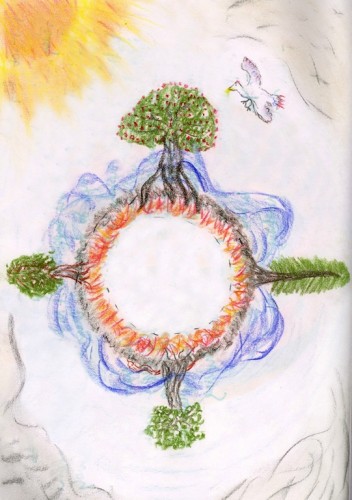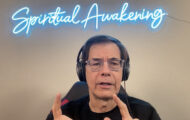FEAR OF SILENCE
Happy Wednesday to You!
I had a busy productive day yesterday. I found time to get into the gym and nourish my need for movement.
As usual, I began my day with tai-chi and meditation with the sun as it rose, and again in the evening as it set.
There is something beautiful for me in silence, but coming to embrace that beauty has been a life-long process.
FEAR OF SILENCE
There is much written by the mystics about our fear of silence. Some, such as Plotinus, have expressed that our fear of silence has to do with the nature of our very soul.

The soul (itself) is Consciousness; consciousness is not a thing.
The soul of us is not to be differentiated from what God Is; people love to label God as this or that, and argue and fight about such labels and descriptions for the very same reason they fear silence.
Were it not for the fact that your soul (consciousness) is encased within the apparent confines of your own body-mind construct, there would be no distinction whatsoever between what you think and feel you are, with what God or Consciousness IS.
Consciousness is as soul dreams. Those dreams express themselves in and as light; E=MC2 expresses the fact that all apparent “matter”, things, are but light entangled, and therefore, metaphysically speaking, are the products of God’s Dreaming.
Just as you dream, and you see your dream within, Consciousness dreams and, through the mystery of Absolute Abundance, manifests Its Dreams.
Plotinus would say that God’s Dream is existence, is nature itself.
When one who is identified with people, places and things goes to bed and sleeps at night, they are generally not afraid because they are “unconscious”.
When one becomes conscious in silence, there is an initial tendency to percolate thoughts, to ruminate over things!persons, places, and more things. This allows the soul, empty of tangible substance (as we know of substance in the material world) to feel as though it has something; thoughts and things become as a pacifier to the soul.
And it is this attraction to the “things of the world” that Plotinus warns are potentially “addictions of the soul”, which can distract the soul from realizing, and returning naturally to what it authentically IS.
Typically, when people begin meditation practices, they are overwhelmed with how many thoughts seem to ceaselessly arise in their consciousness, in their mind.
They often say things like, “the harder I try to meditate, the more my mind seems to jump around!it won’t stop!”
When we fall into a state of being conditioned to feel love only in relationship to persons, places and/or things outside ourselves, we also become conditioned to the inverse; that there is nothing inside ourselves to love, or worthy of loving.
In that condition, we tend to feel naked, abandoned, alone as we approach the natural state of the soul (less the ego-mind), which is Silence – Abiding.
It is as though we don’t want to become conscious that we are not the things of the world. Most of us have been conditioned to feel, and get love by doing this, or doing that.
This process began from the beginning or our life when we found that certain actions incited more attention from our parents and siblings.
Even our biology inherently moves away from pain and toward pleasure. Our whole body-mind construct is conditioned to react to environmental stimuli.
There comes a time in our life where we come to some level of awareness as to:
1. The fact that we can’t ever seem to make everyone happy.
2. The fact that what we do to make one person happy, often makes another unhappy.
3. The fact that when we do what makes us happy, inevitably, it makes one or more others unhappy.
4. The reality that we are unhappy, unsettled or insecure with who we (think we) are.
5. The fact that we are now ready for some peace in our lives and that it will only come when we accept responsibility for creating it.
In my career, I’ve found that if a person doesn’t take responsibility for getting clear on exactly what it is that equates to happiness within themselves, and what they can choose to do to create it, they will never experience happiness.
Worse yet, they will always expect someone, or something else to make them happy. That someone may be your lover, your spouse, or your friend.
What a burden it must be for them to have to take responsibility for creating your happiness.
If it is a substance, such as food, sugar, or drugs, then your happiness becomes dependent upon availability, and such happiness is temporary and illusory at best.
Just look at the lives of people that try to create happiness this way and see if you want to emulate it?
Either way, such approaches to creating peace within are very entangled on circumstances we can’t control.
We can’t be sure someone else will make us happy.
We can’t be sure our drug of choice will be available, or that it will work as well every time.
Expecting people, places, things, and drugs to make us happy naturally leads to insecurity and anxiety because the truth in us, our “conscience”, is always informing us of the games we are playing.
When I’m feeling troubled because happiness isn’t emerging as I’d like it to, or getting caught in feeling responsible for the happiness of others, or the choices they’ve chosen to make, I tend to head out into my rock garden.
When I’m in my rock garden with the trees, plants, animals, birds and stones, I don’t feel any expectations from them. I feel supported, but not judged.
By choosing to be somewhere that supports entering the silence of my inner-being, I can become present with the Truth of myself.
I can remember that I’m not my thoughts, nor am I what others think of, or expect of me; that’s their stuff.
As I sit in silence, I come to the realization that if I think happy making thoughts, I feel happy.
If I think sad thoughts, I feel sad.
If I relax and allow myself to let go of needing to fix myself, or the world, I think no thoughts.
When I think no thoughts, I’m not happy, and I’m not sad. I AM peace.
In the state of “I AM”, there is no spending of my mental-emotional energy. There is no graffiti on the wall so-to-speak.
I become fresh, as though I were a computer that has just had a hard reset.
In that state of being, I’m more alert, more aware of the polarity generated by my desire to choose:
– to choose to be good
– to choose to engage or not to engage
– to choose to think or not to think
– to choose to simply enjoy all that I have and celebrate that “I AM”
Each step of the way, I become more aware of when my reactive mind is projecting its stories onto myself and others.
I become more aware of whose story is mine, and who’s is there’s.
I become clearer as to what I do, or don’t want to add more energy to.
I become clear as to when my “helping” may simply be enabling their own fear of being alone, with their own “I AM”.
As I’ve spent more and more time in silence with my “I AM”, I’ve come to see that God loves it all, every bit of it!
The love affairs, the poor me syndromes, the drug addictions, the relationship battles, the wars, the soap operas, the martyrdom, the victimhood!.all of it.
Yet, I also experience that God loves the “I AM”.
We know that for sure because before there was thought, there was the thinker, the witness, or it would have no value, no means. All but the “I AM” is temporary, fleeting, ephemeral.
You can’t ever truly rely on the mind fluff. It’s like foam on beer.
Next time you feel alone, scared, challenged, confused, addicted, sad, depressed, lonely, angry, or even “happy”, know that those things all come and go like the wind.
Like the foam on beer, and the beer too.
If you want to learn the truth of yourself, and have the inner security of knowing the truth, then by definition, you want to know your “I AM”.
That can only be known in silence – In Abiding.
This practice is beyond religion, beyond meeting expectations.
Silence is the gift of enduring safety and security.
It is the gift of not being afraid of death, for without the body-mind, you always have your “I AM”.
Love and chi,
Paul Chek














Find me on the web